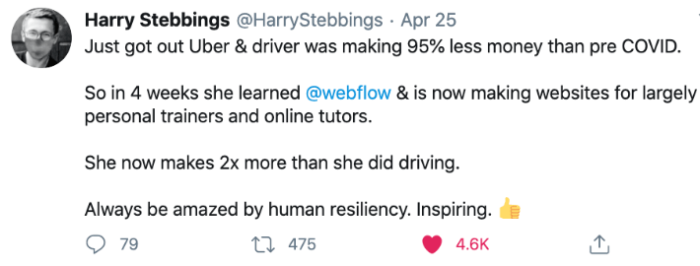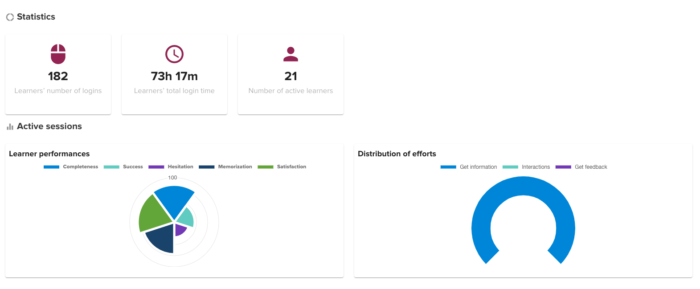
After a regulation of September 5th in 2018 from the French government, the workforces are self-responsible for their own training program. On the same year, the Minister of Labour Muriel Pénicaud, announced that 50% of worker’s profiles should necessarily evolve in the coming years.
There is something to consider. Are we ready to accept, both technological and pedagogical qualified resources – with the indicators they contain – this tendency of learners to cope their skills? We could find two main tendencies: on one side, there is a large expectation on a strong appearance of new careers. Undeniably, new experts on those areas are required to satisfy those training programs. On the other side, new technologies and their adaptation could rush to accelerate the demand in terms of training specificities.
This tendency on new careers modifies for both actors’ (trainers and learners) perspectives, since the demands have now evolved.
As far as the trainer’s posture and its perspective is concerned, there are no longer the same. Why has this changed? Because learners also have new consumer patterns. We could ask as well about the relationship between learner and trainers and how this new behaviour modifies those patterns and perspectives.
Therefore, given the current context on distancing, today more and more courses are available online to simplify learning and to access to training using several media’s devices.
We have organized this article with the following sections:
- Training, an appropriation process of knowledge
- The significance of talking about training.
- Trainer’s new perspective
- Trainer’s role in digital transition
- Learner’s new perspective
- Today learners, tomorrow trainers.
- EdMill, your guide through learning design
Training, an Appropriation Process of Knowledge
Learning opens the door to a new package of knowledge and skills. Trainers appear as the real driver on this process and learners become the main subject, having a significant contribution to this acquirement process.
Mainly, a training course refers to a particular way on the pursuit of new opportunities to adapt to a future environment. This could be taken as a major factor of motivation for learners desiring to adapt their skills to this new set of competencies. Jamy Gourmaud, a french youtuber spoke about how to address knowledge while the lockdown period. His “minute capsules” presented tips to reconsider knowledge and the paths to acquire it. This could be taken as a new trainer’s perspective, since they are those knowledge drivers.
The Significance of Talking about Training.
To motivate learners, training courses should focus on the value of it and not the usual passing of information. We mean by value the adaptation of their capabilities to raise on both professional and personal levels.
In 2016, INSEE (Institut National de la Statistique et des Études – France) explained that 2 of 5 people between 18 to 65 years old had followed at least one professional course. For this reason, including the variation of technology could create easier access and meaningful training programs. For instance, learner’s involvement and trainer’s development enables the effective exchange of interests in skills development.
Trainers’ new Perspective
Alain Meignant suggests that learners should no longer be perceived as receptors of information but as active participants. The main goal for trainers should be to awake knowledge on them instead of teaching it. Apart from “diffusion”, trainer’s role should focus on the ways to facilitate that content, as we could perceived the last couple of years by the adaption to new technologies.
Trainer’s Role in Digital Transition
ICT in education improves engagement and knowledge retention when is integrated into trainings. This tendency from classical teaching to the use of digital devices multiplies the resources on knowledge, creating an appropriation for trainers to those devices. This tendency leads trainers to rethink their methodology on the design of their courses. For instance, trainers should adapt to this digital transition and make sure to present them as a dynamic process.
However, the trainer or even the digital tool are external elements in the learning process, since the skill development belongs mainly to the learner and its personal approach to improve him/herself. Trainers plays the role of negotiator between content and learners. The legitimacy on the content will guarantee a better adaptation and an easier integration.
Learner’s new Perspective.
A training course can’t be longer perceived as “apprenticeship” due to the fact that a learner is demanding more active participation on this process. According to the INSEE (2016), 44% of the workforce between 25 and 34 years old who had followed a non-formal training course (for professional purposes) in the last 12 months, would have liked to follow more formal courses. In addition, this study highlights that due to this, learners would improve their knowledge, the interest in the field and the perspective of these rising new capabilities.
Helped by digital tools, learners are gradually acquiring a set of keys on their field expertise. A major contribution of these tools is the access to information, the communication with the trainer, the counselling on the learning process and the simplicity with their usage.
Today Learners, Tomorrow Trainers ?
Acquiring knowledge and skills in a particular field opens up new horizons. In particular, matching the area’s expertise to the expectations of the field in an uncertain working environment. Learning provides a basis for understanding new issues allowing learners to acquire new opportunities. This can be seen with the development of new profiles linked to the digital transition, which pushes learners to constantly develop their knowledge. In fact, we can compare the world of training to a trip. The goal would be to take learners to discover a field in order to stimulate significance.
With this digital transition and its development, the challenge is to capture the attention of learners through dynamic and innovative content. Therefore, a “trainer” could be seen today as a guide who still has its legitimacy playing a decisive role in this transition.
As for the learners, they wish to become an active participant. Helped by digital tools, they will be able to participate in the design of training modules in collaboration with the trainer, under the goal of backing on their field expertise. MOOCS and some other devices/services prove that we are constantly looking for new ways of knowledge or learning.
Sebastian Thrun, co-founder and president of Udacity says in an article in the New York Times “Crises lead to accelerations, and this is best chance ever for online learning”.
The current crisis of Covid-19 makes possible to accelerate this digital learning process to breed interest in this new form of training design. According to the same article, from a technical point of view, there are 10 million new users from March to May on MOOC’s platforms, which is seven times the rate of new registrations from the previous year. A record result proving this real request to learn.
We are willing to capitalise on our knowledge since the best way to learn is to teach, to coach and to mentoring. To make sure of it, we should be able to perform in a secure context under the technological conditions. This approach is supported by the tools included on EdMill (😉).
EdMill, your guide through learning design.
Thanks to the guidance and counselling parameters included in EdMill, now it’s easier for you to guide your learners through their skills development process. Using tutorials for software parameters or support channels, creating your courses becomes fun.
You could also follow your learners’ knowledge through the statistics page notifying you about their performances, results and evolution on the courses.
Structure your trainings through EdMill’s authoring tool.
Field experts could participate in this process since they support the content you want to create. With EdMill, you can “modify, train, develop” and make learners become future experts.






